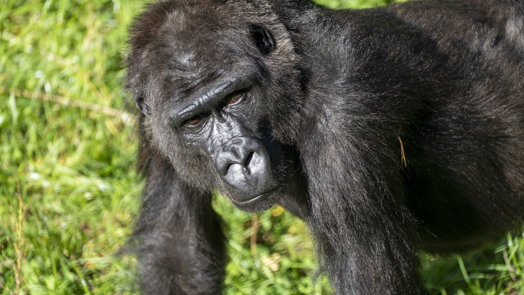
At Burgers' Zoo, we prefer animals to raise their young without zookeepers' intervention. Young animals learn vital skills from their mothers and—depending on the species—their fathers. In certain species, the father actually plays a more important role in this respect. Older siblings may also assist in the process; in some cases, the whole group is involved in forming the young into fully-fledged group members. Animals raised by humans lack these essential, species-specific skills as they grow up, making it difficult to reintroduce them to their conspecifics later. In some cases, there are very important reasons for hand-rearing a young animal. This time: the gorilla.

Gorilla Makoua was rejected by her mother shortly after she was born in the German Zoo in Berlin. She was moved to the Stuttgart Zoo at a very young age.
In consultation with the coordinator of the European gorilla population management programme, the Stuttgart Zoo has a special gorilla sanctuary, where unfortunate young gorillas from all over Europe, who for whatever reason cannot grow up with their mothers, are taken care of. The primate zookeepers there have extensive experience with newborn gorillas, and the little ones can grow up together with their peers. So Makoua grew up with peers and not exclusively with humans, yet these were peers in more or less the same age range.

Gorillas are intelligent apes with relatively few inborn behaviours and many learned ones. Like people, they learn a lot from their parents by watching while growing up. They also learn important social behaviour—how gorillas treat each other—especially from their mothers. How do you react adequately to a reprimand from a higher-ranking animal, and what are the signs of tension within the group? Although Makoua developed physically into a healthy gorilla, this situation caused her to miss out on important life lessons.
Unfortunately, when Makoua reached an age when she was old enough to be introduced into an existing gorilla group, she was already at a disadvantage. On the advice of the coordinator of the European population management programme, that existing gorilla group was the group at Burgers' Zoo, where Makoua arrived on 28 November 2008. After a period of getting used to the gorillas, which was gradually built up, Makoua saw, smelled and heard more and more of the Arnhem gorilla group. In the beginning, Makoua found the large adult conspecifics very exciting.

Makoua's first encounter with silverback Bauwi, an impressive male of almost 200 kg, was not exactly smooth. Normally, a new female is submissive, so the dominant male will quickly accept her into his group. Makoua, however, was so taken aback by the big, silver giant that she suddenly punched him in the face when he curiously came up to meet her! Fortunately, Bauwi brusquely pushed her aside with one powerful swipe of his mighty forearm, and that was it for the time being. As far as Bauwi was concerned, she could stew in her own juice for now!

It took Makoua quite a while to get used to her new living situation, and she spent most of her time on the outskirts of the group in the first months. Slowly but surely, however, the zookeepers observed more and more playful behaviour, especially with the young gorillas in the group. After Bauwi had ignored the strange newcomer for a while, he approached her again and fortunately, Makoua was less fearful and aggressive. Makoua gradually started to find her feet.
A few years later, she was observed mating with Bauwi, and after an eight-month gestation period, Makoua became a mother in 2013! Once again, though, Makoua started this important life event lacking essential skills. Many bottle-fed female apes do not know what to do with their first offspring. However, before and during her gestation period, Makoua had kept her eyes and ears open in the gorilla group, where several adult females were raising young. Since her arrival in Arnhem, no fewer than five gorillas had been born in the group, including a pair of rare gorilla twins. Again, it shows how much young gorillas learn from experienced adults in the group and how important it is for the young animals to watch how experienced females raise their young so that they can copy that behaviour later when they become mothers. After a hesitant start with some trial and error, with Makoua and her infant under strict observation by the zookeepers, Makoua eventually got the hang of motherhood.

Makoua still has phases when she finds it difficult to stand up to some of her group mates, but she is fully accepted in the group and seems to feel at home. Another successfully hand-reared female in the gorilla group demonstrates that personality and character also play an important role in assimilation. Nimba was bottle-fed in Barcelona. She is a very confident ape and has clearly mastered the social skills a gorilla needs in the group.
The story of Makoua illustrates the necessity of hand-rearing to save a young ape from death, and what important life lessons the young animal in question then misses by not growing up with its mother in a natural, socially structured gorilla group. Whether or not to raise a young animal by humans is always an important decision for zoos to consider very carefully.

ARTIS, Safaripark Beekse Bergen and Royal Burgers' Zoo will exchange several female gorillas as part…
26 September 2025
An adult male gorilla arrived at Royal Burgers' Zoo from Warsaw Zoo on Monday, 12 May 2025. The silv…
12 May 2025
